Reading
Log For 1998
ARTIFICIAL
LIFE
A Report From The Frontier Where Computers Meet
Biology (1992)
Paperback
Vintage Books, New York
– 1998.1

- 7: In silico “life”
defined on
a continuum which includes such inanimates
as cars or the economy.
- 9: According to Farmer and Belin (342):
“Our uniqueness will
lie in the ability to create our own
successors.”
- 54: The computer game of “Life” was
invented by
John Horton Conway in the
1960s.
- 158: The Genetic Theory of Natural
Selection
by R. A. Fisher
gives a mathematical theory of evolution.
- 159: Genetic Algorithm (GA) was coined by John Holland.
- 182: More N-iterated Prisoner’s Dilemma examples
from Axelrod
and William
Hamilton:
- Infantry troops in WWI trench warfare had unspoken
agreements not to
shoot.
- Tolerance of male birds when hearing songs of other male
birds.
TALES
OF THE WANDERING
JEW (1991)
Read entirely on 1998.2.20
- Hundreds of stories have been written about the Wandering
Jew,
including
a 1933 movie.
- The story was first written down in the 13th
Century.
- A Romantic poem, The Undying One (1830)
by Caroline
Norton.
- Lew Wallace (author of Ben Hur)
enjoyed Salathiel
(1827) by George Croly so much that he wrote his own story on the
subject, Prince
of India (1893).
- Makes an appearance in the post-holocaust A
CANTICLE FOR LEIBOWITZ (1959) by Walter
M. Miller.
- Nathaniel
Hawthorne wrote
a story, A Virtuoso’s Collection.
- Stableford is not a big fan of the MY
FIRST TWO THOUSAND YEARS (1929) series by George
Sylvester Viereck and Paul
Eldridge,
saying that they were intended to be merely salacious.
- Robert Buchanan wrote a poem entitled The
Wandering Jew: A
Christmas
Carol (1893) where the character meets a person who he
believes to
be Ahasuerus, but is actually Christ, condemned by the crimes committed
in his name.
The Wandering Jew by Rudyard Kipling
- 78:
“If you go once round the
world in an easterly direction,
you gain one day,” said the men of science to John Hay.
The Mystery of Joseph Laquedem by A.
T.
Quller-Couch
- 100:
We did not, of course, touch upon any
religious question—indeed,
of his own opinions on any subject he disclosed extraordinarily little:
and yet as I reached my bedroom that night I told myself that here,
behind
a mask of good manners, was one of those perniciously modern young men
who have run through all beliefs by the age of twenty, and settled down
to a polite but weary atheism.
The Wandering Christian by Eugine
Byrne and Kim
Newman.
THE
INVINCIBLE ADAM
(1932)
Hardcover
1998.3.16 – 1998.3.21
- Last in the trilogy of MY
FIRST TWO THOUSAND YEARS (1929) and SALOME (1930)
- The “autobiography” of Kotikokura
- He represents the spirit of youth.
- Twenty years after the interview with Cartaphilus, Lord
Kotesbury goes
on trial.
- Early history involves the Great Ape, Allatu, ears, and
Adam’s apple.
- 110 -111: Mammon (money) is the only God everyone
worships.
Gold
is good.
- 342: In 1284, he became the Pied Piper.
- 423: Cartaphilus says a bold statement for 1932:
“Kotikokura, let us
disprove the idea of Salome that the
creation of
Jahweh, the creation out of mud, out of the earth, is doomed! He who
has
learned to stand upright, will yet learn to climb to the
stars!”
- The Soviet Union did not turn out the way they expected.
MADAME
BOVARY (1857)
– 1998.4.17
- Charles Bovary: Doctor who married Emma.
- Emma Rouault-Bovary: Bored housewife. Never had
fun at the
Vicompte’s
ball.
- Monsieur Rodolphe Boulanger of La Huchette:
Womanizer. Has
first
affair with Emma. Says they will run away. When he
chickens
out, Emma gets brain fever.
- Léon: Talks to Emma. Goes away for
three
years. When
he returns, they have an affair.
- Homais: Apothecary (chemist). Receives Legion of
Honor.
CRITICAL
PATH (1981)
– 1998.5
All the strengths of all great
politics and religion and most of
business
are derived from the promises they give of assuaging
humanity’s seemingly
tragic dilemma of existing in an unalterable state of fundamental
inadequacy
of life support.
- 9: He makes the argument that whales and chimpanzees
devolved from
inbreeding
atoll-dwelling humans!
- 17: He thinks the bronze age started in Southeast
Asia.
Later, when
he describes a computerized model globe outside the U.N. building,
he
recommends tracing the migration of humans—from Southeast
Asia. Part
of this is based on a New York Times front page in 1977.
- 26: Perhaps all babies are born geniuses, but the false
assumptions of
adults erode this. The education system should be replaced
with TV
video tapes.
- 27: Typical nonsense quote:
Mind possibly may serve as the
essential, anti-entropic (syntropic)
function for eternally conserving the omni-interaccommodative,
nonsimultaneous,
and only partially overlapping, omni-intertransforming,
self-regenerating
scenario—which we speak of as “Universe.”
- 36: The Eratosthenes map from 200 B.C. has edges.
He thinks
this
proved that ancient people had circumnavigated the globe.
- History of economics in a chapter called “Legally
Piggily”.
- 80: WWI leads to the income tax.
- 86: The “dream cars” of the 1920s were
just that,
only superficial changes
between models.
- 86: The bad hog market of 1926 meant that banks took
farmhouses, which
turned out to be worthless.
- 152: On God stuff: Because the laws of Nature do not
contradict each
other,
God exists.
- This would not stand up to Heisenberg and Gödel.
- “radiation is always less effective than
gravity”
- In 1930 Einstein published “Cosmic Religious
Sense - The
Nonanthropomorphic
Concept of God”
- “Ever Rethinking the Lord’s
Prayer”
- 154: Dymaxian World Map projection.
- 173: “Sunset” should be called
“Sunclipse” and “Sunrise”
should be “Sunsight”.
- 178: He proposed a 200 ft geoscope opposite the U.N.
building.
- 192: Suspects that “Big Oil” is behind
the nuclear
buildup. They
know that they will run out of oil, so they want to make the government
support nuclear research.
- 208: Proposes a water channel from the Himmailayas to India.
- 230: The Class of 1966 is the first generation to be raised
by TV and
radio,
which have more authority than parents.
- 232: They have loyalty to all humanity, rather than to the
U.S.
- 235: Highly idealistic college age youth are unwilling
soldiers for the
other side which wants to stir up discontent.
- 263: People should be paid not to drive
to
work. Gasoline
costs millions in “real” dollars. If we
made everyone a billionaire,
we couldn’t spend it all:
They will each discover for
themselves that the greatest luxury in
the
world is to be able to live unencumbered while able to get any
information
you wand in split seconds and any desirable environmental condition you
want in a day.
- Another good idea is connecting world power grids across
the Bering
Strait
to transfer electricity during non-peak hours.
- 293: Engineering recommendations to Brazil center around
making a
network
of small airports.
- 320: Proposes an arcology called “Old Man River
City”.
ON
AGGRESSION (1966)
Paperback
Bantam Matrix Edition, New York
– 1998.5.22
- 69: Jewish and Moslem law against pork may have stemmed to
avoid
trichinosis.
- 140: Erich von Holst removes the brain from a minnow, so it
no longer
has
the inclination to return to school. Others follow it;
By virtue of its deficiency, the
brainless animal had become the
dictator!
This horrible recrudescence of
the ancient mechanisms of flocking
behavior
occurs in mass panic. I was once an unwilling witness of the
sudden
emergence and rapidly snowballing effect of this process of
dehumanization,
and if I was not drawn into its vortex it was only because, thanks to
my
knowledge of flocking, behavior, I had seen the approaching danger
sooner
than others and had had time to guard against my own
reactions. To
me there is small pride in the memory; on the contrary, no one can put
much trust in his own self-mastery who has ever seen men more
courageous
than himself, men fundamentally disciplined and self-controlled,
rushing
blindly along, closely huddled, all in the same direction, with eyes
protruding,
chests heaving, and trampling underfoot everything that comes in their
way, exactly like stampeding ungulates, and no more accessible to
reason
than they.
Just as in human society there
are business partners who work
happily
together but would never think of meeting outside office hours, so
there
are in many animal species individual ties arising only through a
common
interest of the partners in a shared
“enterprise.” The anthropomorphizing
animal lover will not be pleased to hear that in many birds, including
some that live in lifelong “matrimony,” male and
female have no interest
in each other’s company unless they have a common function to
fulfill at
the nest or in the service of the brood.
In nature we find not only that
which is expedient, but also
everything
which is not so inexpedient as to endanger the
existence of the
species.
- 150: Railways carriers are a good place to study
territoriality and
acquaintanceship.
People will cover empty spaces with their coats and bags for strangers,
but suddenly become polite to people with the merest acquaintance.
- 230:
It is a curious paradox that the
greatest gifts of man,
the unique faculties of conceptual thought and verbal speech which have
raised him to a level high above all other creatures and given him
mastery
over the globe, are not altogether blessings, or a least are blessing
that
have to be paid for very dearly indeed. All the great dangers
threatening
humanity with extinction are direct consequences of conceptual thought
and verbal speech. They grove man out of the paradise in
which he
could follow his instincts with impunity and do or not do whatever he
pleased.
There is much truth in the parable of the tree of knowledge and its
fruit,
though I want to make an addition to it to make it fit into my own
picture
of Adam: that apple was thoroughly unripe! Knowledge
springing from
conceptual thought robbed man of the security provided by his
well-adapted
instincts long, long before it was sufficient to provide him with an
equally
safe adaptation. Man is, as Arnold Gehlen has so truly said,
by nature
a jeopardized creature.
- 233: Heavily armed carnivores (such as wolves) have
inhibitions from
killing
another member of the species with one stroke.
- 260: Ukrainian proverb about going to war:
“When the banner is unfurled, all reason is
in the
trumpet.”
SPACE
(1982)
Hardcover
Random House, New York
– 1998.6.23
- A fictional work revolving around the “Solid
Six”
Astronauts of the Gemini
and Apollo programs.
- The major WWII battle of Leyte Gulf makes Captain Grant a
hero, and
later
a senator.
- Stanley Mott searches Germany for the rocket scientists of
Peenemünde.
- John Pope becomes a test pilot at Patuxent River (Pax),
then an
astronaut.
- Randy Claggett is a fellow Solid Six who dies in Apollo 18
while on a
(fictional)
trip to the “dark” side of the moon with black
astronaut Paul Linley (Gawain
Butler’s nephew).
- 96: Football worship. When asked if a character
is
“bright, good
man?” the response is that “He’s a
football player,”
- 98: On Rachel:
her lovely blond hair and elegant
figure would ensure a good
marriage.
- Yet Penny Pope becomes an important mover in D.C.
(she’s a
Republican,
of course).
- 100:
The test of a woman is how she
organizes space.
- Cynthia Rhee is a reporter who wants to sleep with all the
Solid Six to
get the real story of the astronauts, not the storybook version.
- Senator Grant’s wife falls for the alien
conspiracy theory of
Dr. Leopold
Strabismus, who later becomes a TV evangelist.
- Later, a religious fundamentalism sweeps the
nation. In one
example,
pressure is put on park rangers to stop referring to natural wonders as
being millions of years old.
- Nobody in Fremont trusts Roman Catholics or the Irish.
- 419 - 420: The Flat Earth Society doesn’t trust
photos from
space.
- Mott tries to have an intelligent commission on life in the
universe,
but
it turns into a religious shouting match. He believes in the
Big
Bang and all, but still clings to God.
MOONRISE
Book One of The Moonbase Saga (1996)
Paperback
Avon Books, New York
to 1998-07

- VTOL Clipperships allow easy space access and high speed
transcontinental
service.
- Nanotech enables easy Lunar construction, though they can
be used as
weapons.
- Nanotech leads to anti-science hysteria and religious
fascism.
GAIN
(1998)
Hardcover
Farrar Straus Giroux, New York
1998.7.2 – 1998.7.3
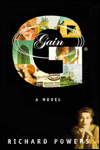
- Lacewood (IL?): Home of Clare Chemical.
- Laura Bodey: Real estate broker. Gets
cancer.
Reluctantly joins
class-action suit against Clare International.
- Don: Laura’s ex-husband.
- Ellen: Daughter.
- Tim: Teenage son. Into computers. Uses
settlement
money as
capital for computer program to predict enzyme action.
- Clare made its fortune on “Native Balm”
soap with
the tag line:
“The Red Man never worried about his skin .
. . Why should
you?”
- 319: Theory on cancer based on ring-shaped molecules with
chlorine in
them
get taken into the tissue of women, where the body turns them into long
lasting xenoestrogen, which signals the reproductive system to start
massive
cell division.
- 354: After the funeral, they discover post-it notes all
over the house:
Maybe a hundred color-coded notes,
throughout the house.
All the things none of them knew how to do. They sold the other house,
his father’s, and moved back to the one with all the
instructions.
- Clare slowly transformed into worrying more about
consumer-oriented
packaging,
advertising, etc.
- 321: War thriftiness:
By collecting a billion pounds of fat
and supplying
a good 13 percent of needed grease, the country’s housewives
saved the
soap industry. Ladies! the radios teased. Get
your fat cans down
to the grocery store!
- 345 - 348: Detail about how al the parts of a
disposable
camera come
together;
as a metaphor for mortality:
A nurse’s aide throws it out,
prior to the next occupant.
For the entire engineering magnificence was designed to be pitched.
Labor,
materials, assembly, shipping, sales markups and overheads, insurance,
international tariffs—the whole prodigious creation costs
less than ten
dollars. The world sells to us at a loss, until we learn to afford it.
Such a wonder has to be cheap enough to
jettison.
You cannot have a single-use camera except at a remarkable price. Buy
it;
shoot it; toss it. As mundane as any breakthrough that seemed our whole
salvation once. A disposable miracle, no less than the least of us.
COUNT
ZERO (1986)
Paperback
Ace Books, New York
1998.7.4 – 1998.7.5
- Count Zero Interrupt (a.k.a. Bobby Newmark): Pulls a
Wilson
his first
time
out. Was testing for Two-A-Day.
- Turner: Street Samurai who specializes in
“defections” between corporations.
Mitchell was to defect from Maas.
- Marly: Art dealer hired by Josef Virek to find the
sculptor
of the
“boxes”.
- Angie Mitchell: Implanted by her father for not being
smart
enough.
Subconsciously jaunts around as Vyèj Mirak
(“Virgin of Miracles”).
- The Boxmaker turns out to be a manipulator robot in
orbit,
run by and
A.I.
(Neuromancer?). Some Voodoo-like entities are haunting
cyberspace.
Does Turing know?
- Jaylene Slide: Burns Conroy (Turner’s agent)
for
killing
Ramirez.
- The series continues in MONA
LISA OVERDRIVE (1988)
FIRESTAR
(1996)
Hardcover
TOR, New York
1998.7.5 – 1998.7.8

- Mariesa Van Huyten: Inherits a huge fortune.
Intends to put
humans
into space—to stay. Many (including many relatives
and those in her
own company) want to stop her. Deathly afraid of asteroid
impact.
Member of secret “Prometheus” group who share
“The Goal”.
- Barry Fast: Teacher whose school becomes a charter
school
owned by
Mariesa.
Having an affair with a married woman. Tries to help Mariesa
relax
during difficult times. They marry.
- Styx: Manipulated by Mariesa to become a
poet.
Very resentful.
- Ned: Hotshot test pilot. Ends his
indiscretions
and becomes
faithful
to his wife.
- Chase: One of the students who follows in
Ned’s
footsteps.
- Developing SSTO Vertical Takeoff & Landing
RLVs. Have
to team
up with another company which uses railgun to send fuel into orbit.
- Launch from Brazil, hoping the U.S. won’t
enact
Chapter 35.
- Computer nerd Poole hijacks shuttle external fuel tank.
- They rent Mir.
- Later use ground-based laser to power impulse
engine. This
was not
explained very well.
- No mention of radiation.
- Because the development was all done privately, there
is a
lack of
regulations.
- The series continues in ROGUE
STAR (1998)
SPACE
TRAVELER’S HANDBOOK
Every Man’s Comprehensive Manual To Space
Flight
(1979)
Hardcover
Sovereign Books, New York
1998.7
- Written from the perspective of 2061.
- Has very good explanations of Apollo and Soyuz capsules.
- Like many contemporary books, it is very optimistic
about
cost savings
from the Space Shuttle.
- Excellent explanation of novel propulsion mechanisms,
including solar
sails.
WELCOME
TO MOONBASE
(1987)
1998.7
- The author obviously did not know about high space
costs,
the fall of
the
Soviet Union, and discovery of water on the moon.
- Written as propaganda for Moonbase, Inc. so it will not
mention the
drawbacks.
- Excellent paintings.
- 124: Near-Earth Asteroids
- Apollo group: cross the Earth’s orbit
- Atens: smaller group, orbit between the Earth and Sun
- Amor: farther out, cross orbit of Mars and Earth
-
DINOSAUR
IN A HAYSTACK
(1995)
Hardcover
Harmony Books, New York
– 1998.7.16

- The 2000 vs. 2001 debate was because of Dionysius
Exiguus
(“Dennis the
Short”), a 6th Century monk writing a
chronology for Pope Saint
John I.
- During the San Francisco earthquake of 1906, the statue
of
Louis
Agassiz
fell off a building at Stanford University and landed headfirst in the
pavement. He was the last serious Creationist (died in
1873).
David Starr Jordan, president of Stanford, is said to have remarked:
“Oh, well, I always thought better of
Agassiz in the concrete
than in the
abstract.”
Section 55
Are God and Nature then
at strife,
That Nature lends such evil dreams?
So careful of the type she seems,
So careless of the single life;
Section 56
“So careful of
the type?” but no.
From scarped cliff and quarried stone
She cries, “A thousand types are gone:
I care for nothing, all shall go.
[Man]
Who trusted God was love
indeed
And love Creation’s final law—
Tho’ Nature, red in tooth and claw
With ravine, shriek’d against his creed—
- Tennyson was influenced by the catastrophists who
argued
the nonevolutionary
process of successive creations separated by catastrophic extinctions.
- 148: Darwin
wrote in an 1861 letter:
About thirty years ago there was much talk that
geologists ought only
to
observe and not theorize; and I well remember someone saying that at
this
rate a man might as well go into a gravel pit and count the pebbles and
describe the colors. How odd it is that anyone should not see that all
observation must be for or against some view if it is to be of any
service!
- 173: E.
A. Poe
only wrote one
book that was reprinted in his lifetime, The
Conchologist’s First
Book. Of course he only put his name on
it for legal reasons,
and most of it was plagiarized.
- Why are illustrations of shells often printed backwards?
- 249: George Gamow wrote Mr.Tompkins
in
Wonderland
(1940)
about relativity and quantum physics.
- 255: Taxonomy of mammals.
- 287: The Supreme Court upheld compulsory sterilization
of
the mentally
unfit in 1927, which was the greatest victory for Eugenics.
- 297: Sir Ronald Aylmer Fisher (1890 – 1962)
was a
founder of
modern evolutionary
theory. About 1/3 of his 1930 book The
General Theory of Natural
Selection is devoted to eugenics. He was
also convinced that
smoking did not cause cancer.
- 309: The Nazi Wannsee Conference of January 20, 1942
was
location for
plan
about Endlösung der Judenfrage = “Jewish Final
Solution”.
- 359 - 376: For a long time Creationists ridiculed the
transition of
whales
from land to water. Recent finding, however, show the
transitions
quite clearly.
- The “Leviathan” of the Bible might
have
meant
crocodile or whale.
- 377 -378:
As a powerful corrective to this
arrogant tradition of natural
theology,
evolutionists argued, early and often, that nature’s
undoubted order is
neither benevolent in our terms (but “red in tooth and
claw”. . .), not
established with us in mind or at the helm. The kind of God implied by
nature’s actual composition might not be a deity worthy of
our worship.
- 378: The story of when J. B. S. Haldane was asked about
the
Creator,
and
remarked that he had “An inordinate fondness for
beetles”. There
are about 8,000 species of mammals and about 400,000 species of beetles.
- 389: A lungfish is actually more related to a cow than
a
trout because
trouts broke away earlier.
- 410:
We predict that an evolutionary tree
built from DNA
resemblances should be congruent with the traditional classification
based
on morphology. Creationists, on the other hand, should expect no such
similarity,
for God may do as He pleases. Why should entirely different criteria
record
the same supposedly nonexistent pattern of evolutionary branching? (Of
course, one might say that God chose to create with such congruence,
but
then God becomes meaninglessly omnipotent—that is, so
flexible, so available
for invocation to achieve any conceivable result that He becomes truly
impotent for failure to illustrate any distinctive act that might test
the nature of His unique ways and power.)
- 443: In Greece, ΣΤΑΣΙΣ
means
bus stop.
A moving company of a luggage cart is a ΜΕΤΑΦΟΡΑ
= “metaphor”.
MONA
LISA OVERDRIVE
(1988)
Paperback
Bantam Books, New York
– 1998.7.18

- Kumiko: Daughter of Yakuza boss. Sent to
England
with Swain
for safety.
- Swain: Given information by 3Jane.
- Petal: In charge of her security.
- Kid Africa: Dumps the count on Slick in care of Cherry.
- Little Bird
- Slick Henry: Caught for grand theft auto.
Given
Korsakov’s treatment
which causes loss of short-term memory. Builds robots in
Gentry’s
factory to cope.
- Mona: Prostitute who undergoes surgery to look like
Angie
Mitchell.
- Tick: Cowboy in England and friend of Sally Shears
(a.k.a.
Molly).
- Angie: Now a big Sim/Stim star.
- At the end, many characters end up in the Aleph (a deck
that
approximates
the matrix): Bobbie, Angie, 3Jane, Continuity (Sense/Net A.I.), The
Finn,
and Colin (Kumiko’s portable A.I.).
BURNING
CHROME (1986)
Paperback
Ace Books, New York
1998.7.x
- Collection of Gibson’s short stories (often
with
coauthors),
including
the source of the movie Johnnie Mnemonic.
Johnny Mnemonic
- 1: First line ():
I put the shotgun in an Adidas bag and
padded it out with four pairs of
tennis socks, not my style at all, but that was what I was aiming for:
If they think you’re crude, go technical; if the think
you’re technical,
go crude. I’m a very technical boy. So I decided to get as
crude as possible.
VIRTUAL
LIGHT (1993)
Paperback
Bantam Books, New York
1998.7.22 – 1998.7.24

- Takes place in 2005, where California is split into
NoCal
and SoCal
(S.F.
and L.A. after “Little Grande” earthquake).
- Stephen Berry Rydell: Cop turned security guard.
- Sublett: Allergic. Raised on Reverend
Fallon’s
tv-worship.
Wears reflective contacts.
- Chevette: Bike courier who steals VR glasses.
Lives with
Skinner
on the bridge.
- Yamazaki: Graduate student doing research on the bridge.
- Republic of Desire: Hacker cell, with members like
God-eater
- Warbaby
- Freddie
- Loveless
- Svobodov & Orlovsky
- “Cops in Trouble”
reality TV
show.
- Shapeley: Cured AIDS by spreading his own benign
mutated
HIV.
Becomes
a Christ-Figure.
IDORU
(1996)
Hardcover
G. P. Putnam’s Sons, New York
1998.7.24 – 1998.7.26

- The title refers to Japanese virtual entertainers
(Sharon
Apple,
anyone?)
- Rei Toei: Wants to be human.
- Chia Pet McKenzie: 14. Sent to Japan by the
Seattle fan club
of Lo/Rez
to investigate the rumor of Rez’s marriage to Rei
Toei. Her mother
didn’t even realize she had gone. Accidentally
smuggled nanotech.
Chased by the Russian mafia.
- Laney: Skilled in “filtering”
information on the
net. Tried to prevent
the suicide of Alison Shires. Got a job via Rydell.
- Yamazaki: Still taking notes.
- Keith Alan Blackwell: Security for Rez.
- Maryalice: Smuggles for Eddie.
- Masahiko: Mitsuko’s brother. Has
“responsibilities” in Walled City
(a computer construct).
- Zona (a.k.a. Mercedes Purissima Vargas-Gutierrez):
Chia’s
friend from Mexico
over the Net. Has congenital disease which makes her too
dependent
on Zona persona.
DESCARTES’
ERROR
Emotion, Reason, And The Human Brain (1994)
Hardcover
G. P. Putnam’s Sons, New York
– 1998.8.25

- Phineas Gage was a responsible railroad worker who blew
an
iron rod
thought
his head. His change of personality was a great blow to the
dualistic
hypothesis.
- anosognosia = condition where you deny
there’s
anything wrong
with you.
For example, loss of use of an arm.
- 264 - 265: Chronic absence of pain.
- trigeminal neuralgia (a.k.a. tic douloureux) = pain
with
neural origin.
-
- 211: Patients with frontal damage undergoing skin
conductance test did
not “feel” emotion, but realized that they did not
express emotion.
One patient “knew” that the pictures which he was
shown were disturbing,
but did not “feel” disturbed.
- 227 - 228: Brain in a vat.
- 242 - 243: Hypothesis for “self”:
I propose that subjectivity
emerges during the latter step when the
brain is producing not just images of an object, not just images of
organism
responses to the object, but a third kind of image, that of an organism
in the act of perceiving and responding to an object. I believe the
subjective
perspective arises out of the content of the third kind of image.
- 243: Crick’s hypothesis on consciousness
focused
on the
problem of image
making; leaving out subjectivity.
- 244: Daniel Dennett focuses on high-end of
consciousness.
- 244: As with Gerald Edelman, the author accepts a
neural
basis of
consciousness,
despite some differences.
- 244: William James thought that no reasonable
psychology
could question
the existence of “personal selves”.
- 248: Descartes
first wrote “Je
pense donc je suis” (in French) in Discourse
on the Method
(1637); then “Cogito ergo sum” (in Latin) in Principles
of Philosophy
(1644). His dualistic hypothesis separates “res
cogitans”
(thinking from mechanics) from “res extensa”
(rest of the body),
which is the exact opposite of what the author believes.
- 249: Descartes’
tombstone reads
“Bene qui latuit, bene vixit”
from Ovid’s Tristia (3.4.25)
= “He who hid well, lived well”.
- 252:
The truly embodied mind I envision,
however, does not
relinquish its most refined levels of operation, those constituting its
soul and spirit, with all their dignity and human scale, are now
complex
and unique states of an organism. Perhaps the most indispensable thing
we can do as human beings, every day of our lives, is remind ourselves
and others of our complexity, fragility, finiteness, and uniqueness.
And
this is of course the difficult job, is it not: to move the spirit from
its nowhere pedestal to a somewhere place, while preserving its dignity
and importance; to recognize its humble origin and vulnerability, yet
still
call upon its guidance. A difficult and indispensable job indeed, but
one
without which we will be far better off leaving Descartes’
Error uncorrected.
CONSILIENCE
The Unity Of Knowledge (1998)
Hardcover
Alfred A. Knopf, New York
– 1998.8.30
- The author is concerned about the lack of communication
between
disciplines.
- 6: Raised a Baptist, he later has doubts:
I found it hard to accept that
our deepest beliefs were set in stone
by agricultural societies of the eastern Mediterranean more than two
thousand
years ago. I suffered cognitive dissonance between the cheerfully
reported
genocidal wars of these people and Christian civilization in 1940s
Alabama.
It seemed to me that the Book of Revelation might be black magic
hallucinated
by an ancient primitive. And I thought, surely a loving personal God,
if
He is paying attention, will not abandon those who reject the literal
interpretation
of the biblical cosmology. It is only fair to award points for
intellectual
courage. Better damned with Plato
and Bacon, Shelley
said, than go to heaven with Paley and Malthus. But most of all,
Baptist
theology made no provision for evolution. The
biblical authors had
missed the most important revelation of all! Could it be that they were
not really privy to the thoughts of God? Might the pastors of my
childhood,
good and loving men though they were, be mistaken? It was all too much,
and freedom was ever so sweet. I drifted away from the church, not
definitely
agnostic or atheistic, just Baptist no more.
- 14: Wilson defines the end of the Enlightenment with
the
death of the
Marquis
de Condorcet during the Reign of Terror.
- 27: Bacon warns against “idols of the
mind”.
- 31 - 32:
The cost of scientific advance is
the humbling recognition that
reality
was not constructed to be easily grasped by the human mind. This is the
cardinal tenet of scientific understanding. Our species and its ways of
thinking are a product of evolution, not the purpose of evolution.
- 108: prosopagnosia = where one cannot recognize other
people by their
faces,
but can recognize voices.
- 108: Patients with temporal lobe epilepsy often develop
hyperreligiousity
and hypergraphia = a compulsion to express visions in streams of poems,
letter, etc.
- 110: Consciousness deals with brain networks according
to
S. J. Singer
in his quip, “I link, therefore I am.”
- 129 - 130:
Perhaps God did create all
organisms, including human beings, in
finished
form, in one stroke, and maybe it all happened several thousand years
ago.
But if that is true, He also salted the earth with false evidence in
such
endless and exquisite detail, and so thoroughly from pole to pole, as
to
make us conclude first that life evolved, and second that the process
took
billions of years. Surely Scripture tells us He would not do that. The
Prime Mover of the Old and New Testaments is variously loving,
magisterial,
denying, thunderously angry, and mysterious, but never tricky.
- 199: Proof of Hardy-Weinberg principle (
p + q = 1.0
(p + q)2
= (1.0)2
p2 + 2pq
+ q2 = 1.0
- 248: Wilson frames a debate between a transcendentalist
and
a
skeptic.
The empiricist concludes with:
“We can be proud as a
species because, having discovered
that we are
alone, we owe the gods very little. Humility is better shown to our
fellow
humans and the rest of life on this planet, on whom all hope really
depends.
And if any gods are paying attention, surely we have earned their
admiration
by making that discovery and setting out alone to accomplish the best
of
which we are capable.”
- 278: Wilson says we are becoming a new species,
“homo
proteus”.
- The book ends with a warning about the dire
consequences of
overpopulation.
CHILDREN
OF THE MIND
(1996)
Hardcover
TOR, New York
– 1998.9.3
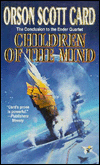
- A wonderful new transportation technology is developed
(in
hours) based
on “understanding” Brownian motions.
A
HAPPY DEATH (1937)
Translated from the French by Richard
Howard
Hardcover
Alfred A. Knopf, New York
– 1998.9.7
- Although finished in 1937, this semi-autobiographical
work
was not
published
until 11 years after his death.
- Mersault is introduced to a cripple named
Zagreus. After
discussing
life and death, Mersault shoots him (more like assisted suicide), takes
his money, and cruises Europe.
- 75:
He wanted to crush himself into
that mud, to re-enter the earth by
immersing
himself in that clay, to stand on that limitless plain covered with
dirt,
stretching his arms to the sooty sponge of the sky, as though
confronting
the superb and despairing symbol of life itself, to affirm his
solidarity
with the world at its worst, to declare himself life’s
accomplice even
in its thanklessness and its filth.
And with pain and joy, their
hearts learned to hear that double
lesson
which leads to a happy death.
He had been unfair: while his
imagination and vanity had given her
too
much importance, his pride had given here too little. He discovered the
cruel paradox by which we always deceive ourselves twice about the
people
we love—first to their advantage, then to their disadvantage.
But before losing consciousness,
he had time to see the night turn
pale
behind the curtains and to hear, with the dawn and the
world’s awakening,
a kind of tremendous chord of tenderness and hope which without doubt
dissolved
his fear of death, though at the same time it assured him he would find
a reason for dying in what had been his whole reason for living.
CLIMBING
MOUNT IMPROBABLE
(1996)
Norton Paperback, New York
– 1998.9.13

- 6: Defines designoid (“design-oid”)
as
things that
look “designed” but
are products of natural selection.
- 68:
We are accustomed to seeing a computer
model as a simplification
of the real world. But there is a sense in which computer models of
natural
selection are not simplifications but complications of the real world.
- 97: Macro-mutations do happen. Example of a frog with
eyes
inside its
mouth.
- Chapter 4: Flying in birds probably evolved from
running,
not gliding.
- 99: Quote from Blind Watchmaker:
“however many ways there
may be of being alive, it is certain that there are vastly more ways of
being dead.”
- 164: Computer simulation of evolution of a fish eye.
- 195: Mountain diagram of various types of eyes.
- 159: Ultra violet view of a flower.
SEMPER
MARS
Book One Of The Heritage Trilogy (1998)
Paperback
Avon Books, New York
1998.9.18 – 1998.9.19

- The U.S. Marines, facing disbandment and obsolescence,
find
a new
mission:
protecting U.S. archaeological interests on Mars. The Cydonia
“face”
is just the tip of an alien culture, including bodies of early homo
sapiens.
- In order to keep its sovereignty, the U.S. has pulled
out
of the U.N.
decades
sooner. Tensions escalate to all-out war when the U.N.
decides to
suppress information from Mars.
- 30 - 31: Global warming has caused the sea levels to
rise.
The only
solution is the wholesale industrialization of space, including solar
orbital
power stations and Mars technology.
THE
FALL (1956)
&
EXILE
AND THE KINGDOM
(1957)
Translated from the French by Justin
O’Brien
Hardcover
The Modern Library, New York
– 1998.9.20
- The Fall is the
story of
Jean-Baptiste Clamence (not his
real name) who used to be an altruistic (though lecherous) lawyer in
Paris.
Now he unloads his sob story at a Dutch bar called “Mexico
City”.
- 74:
If I had been able to commit
suicide and then see their [his
friends’]
reaction, why, then the game would have been worth the candle. But the
earth is dark, cher ami, the coffin thick, and the
shroud opaque.
- 77: Analogy to a lion tamer:
If, before going into the cage,
he has the misfortune to cut himself
while shaving, what a feast for the wild animals!
- 107: Whenever he mentioned God during court, his
clients
became anxious:
Whence it was but a step to
conclude that I invoked the divinity in
proportion to my ignorance.
- Was it that he witnessed a woman jump off a bridge that
pushed him over
the edge? Or was it his experience in a POW camp in Africa?
- The short stories of Exile and the
Kingdom
where hard to
follow and/or seemed pointless.
MICROSERFS
(1995)
Paperback
ReganBooks, New York
– 1998.9.23

- A group of Microsoft coders leave Seattle (and Bill!)
to start ‘OOP!’ in Silicon
Valley. OOP! is like a lego
set for software.
- Dan: His diary. Computer password is
“hellojed” after his brother
who drowned.
- Karla: Was very thin. Her parents called her
stupid. Falls
for Dan.
- Bug Barbecue: Comes out.
- Abe: Stays at Microsoft for a while, then bails them
out
with
C-A-P-I-T-A-L.
- Susan: Goes from Barbie to Chyx.
- Todd: Into body-building. Meets Dusty, and
they
have a child.
- Ethan: Marketing.
- Michael: Very zen. Falls in love over the net
with BarCode
(a.k.a.
Amy).
- Anatole: French.
- Dan’s dad gets laid off from IBM.
His
mom has a
stroke and the novel
ends with them using facilitation to communicate.
- 186:
You just can’t compete with
the dead. It would be easier
if I had another brother or a sister, but I was born after the Pill.
- 259: When told that any multiple of 6, minus 1 is a
prime
number:
All work STOPPED immediately as
everybody set out to prove its
validity.
PALE
BLUE DOT
A Vision Of The Human Future In Space (1994)
Full Size Paperback
Random House, New York
– 1998.9.29

- 38: On the Anthropic Principle:
But essentially the same laws and
constants are required to make a
rock.
So why not talk about a Universe designed so rocks could one day come
to
be, and strong and weak Lithic Principles? If stones could
philosophize,
I imagine Lithic Principles would be at the intellectual frontiers.
- 123: The Creation Story is 7 days long and there are 7
days
in the week
because ancient people could follow the 7 visible planets.
- 259: The solar sail was Konstantin
Tsiolkovsky’s
idea.
- 316: Sagan suggests intercepting an Earth Crossing
Asteroid
(ECA) at
perihelion!
- He points out the dangers of interception
technology. Someone
could
try to purposely cause an impact.
- 318: It would only take 60 megatons to get asteroid 1991OA
to impact
in 2070.
- 391: The sun creates a gravity lens at a radii of 550
AU. A
radio
telescope there could resolve a continent at a nearby solar system or a
few AUs at a distance to the nearest spiral galaxy.
THE
DIFFERENCE ENGINE
(1991)
Paperback
Bantam Books, New York
1998.9.30 –

- Set in an alternate 1855 London where steam-driven
“engines” (invented
by Babbage) run credit and government records.
- Lord
Darwin
obviously wasn’t afraid
to publish in this history.
- Lord
Byron
wages guerilla
warfare on Lord Wellington’s Tories to become Prime
Minister. His
Radical Party hunts down the anarchist luddite Shelley.
- The British take their science very
seriously.
The Savants
are the
new upper class. Museums abound.
- YMAA = Young Men’s Agnostic Association
- Captain Swing: Leads a revolt from India Company docks
after most of
Parliament
leaves due to the Stink.
- Florence Russell Burtlett: A murderess.
- Lady
Ada Byron
searches for
the Modus, a system to win at gambling.
- Edward “Leviathan” Mallory: Found a
Brontosaurus in
Western U.S.
Hunts Swing with his brothers. Holds a stack of cards from
Ada Byron.
- Oliphant: A “journalist” who is
really
an
intelligence operative.
Sends Fraser to guard Mallory.
- John
Keats:
On the cutting edge of
kinotropy.
- Sybil Gerard: Daughter of a Luddite. She
witnesses the
attempted
assassination of Sam Houston and steals his diamonds.
- It is already possible to erase one’s
identity.
CONTACT
(1985)
Hardcover
Simon And Schuster, New York
– 1998.10.10
Paperback:
- Ellie Arroway: In the book, she is more interested in
her
personal
appearance.
- Kitz
- S. R. Hadden: Invented a TV tuner that omits
commercials. An
upgrade
tunes out preachers.
- Palmer Joss: “Evenhanded” with
science
and religion.
- 25: Quote from Skeptical Essays I
(1928) by Bertrand
Russell:
I wish to propose for the
reader’s favourable consideration
a doctrine which may, I fear, appear wildly paradoxical and subversive.
The doctrine in question is this: that it is undesirable to believe a
proposition
when there is no ground whatever for supposing it true. I must, of
course,
admit that if such an opinion became common it would completely
transform
our social life and our political system; since both are at present
faultless,
this must weigh against it.
- 135: A line from Joss that made it into the movie:
“Are we fundamentally happier?
Or do
the scientists bribe us
with toys, with technological trinkets, while they undermine our
faith?”
“The man is scared
stiff,” Ellie said. “His perspective
is narrow. He imagines the Message is going to be unacceptable biblical
exegesis or something that shakes his faith. He has no idea about how a
new scientific paradigm subsumes the previous one. He wants to know
what
science has done for him lately. And he’s supposed to be the
voice of reason.”
- 155: One of the Soviet scientists points out that
“Head over
heels” is
backwards.
- 163: Quote from Euripides in Hecuba:
Do we, holding that the gods exist, deceive ourselves with
insubstantial
dreams and lies, while random careless chance and change alone control
the world?
- 172: Responding to the idea that God can do anything:
“Anything you don’t
understand, Mr. Rankin, you attribute
to God. God for you is where you sweep away all the mysteries of the
world,
all the challenges to our intelligence. You simply turn your mind off
and
say God did it.”
- 173: Ellie claims to be a
“Christian”
because she
thinks Jesus was a good
teacher?
- 174: Joss argues that without God, there is no purpose.
- 231: Hadden invents Adnix and Preachnix using
“context” technology.
The absence of advertising is an
alternative. If products
were really different, there would be no need for ads.
- 287: Hadden:
“You see, the religious
people—most of them—really think
this planet is an experiment. That’s what their beliefs come
down to. Some
god or other is always fixing and poling, messing around with
tradesmen’s
wives, giving tablets on mountains, commanding you to mutilate your
children,
telling people what words they can say and what words they
can’t say, making
people feel guilty about enjoying themselves, and like that. Why
can’t
the gods leave well enough alone? All this intervention speaks of
incompetence.
If God didn’t want Lot’s wife to look back, why
didn’t he make her obedient,
so she’d do what her husband told her? Of if he
hadn’t made Lot such a
shithead, maybe she would’ve listened to him more. If God is
omnipotent
and omniscient, why didn’t he start the universe out in the
first place
so it would come out the way he wants? Why’s he constantly
repairing and
complaining? No, there’s one thing the Bible make clear: The
biblical God
is a sloppy manufacturer. He’s not good at design,
he’s not good at execution.
He’d be out of business, if there was any
competition.”
“You look at human history and it’s clear
we’ve been on our own.”
“In Mozambique, the
story goes, monkeys do not talk,
because they know
if they utter even a single word some man will come and put them to
work.”
- 414: We need a space radio telescope on the other side
of
the
sun.
They could resolve something the size of the Earth at the center of the
Galaxy.
DIRK
GENTLY’S HOLISTIC DETECTIVE AGENCY
(1987)
1998.10.10 – 1998.10.15
- An electric toaster toasts bread. Along a
similar
vein, an
electronic
monk believes.
- Gordon Way: Works for a computer company. Is
killed by the
Monk and
becomes a ghost.
- 32:
He believed in a door. He must
find that door. The door was the way
to. . . to. . .
The Door was The Way.
Good.
Capital letters were always the best way
of dealing
with things you didn’t have a good answer to.
“Come. . . let us go.
Let us leave this festering
hellhole. Let us think
the unthinkable, let us do the undoable. Let us prepare to grapple with
the ineffable itself, and see if we may not eff it after
all.”
MOONWAR
(1998)
Paperback
Avon Books, New York
1998.10.16 – 1998.10.17
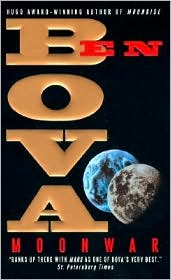
- The U.N., influenced by the Yamagata Corporation,
attempts
to take over
Moonbase. While the invasion was successfully repelled with
no weapons,
the ending was a bit unsettling:
- Joanna Stravenger-Brudnoy worked out a merger with
the
Yamagata
Corporation.
- The President of the U.S., the U.N.
Secretary-General,
Seigo Yamagata,
and “Omar” Rashid all conspired or allowed this to
happen. It’s not
clear who all knew about the suicide bombers. Nobody was
implicated.
- The ideas behind the New Morality are still alive and
strong.
- Seigo will probably be cured of cancer (with
nanotech)
even though the
suicide bombers killed Zimmerman, the person who invented the
technology.
- Where is the independent media? Only a few
“suits” seem to be able
to enact an entire news blackout.
GENERATION
X
Tales For An Accelerated Culture (1991)
Paperback
St. Martin Press, New York
1998.10.17 – 1998.10.24

- Andy, Dag, and Claire are friends.
- Dag likes to deface cars that are expensive and/or
annoy
him.
- 5:
MCJOB: A low-pay, low-prestige,
low-dignity,
low-benefit, no-future
job in the service sector. Frequently considered a satisfying career
choice
by people who have never held one.
BRAZILIFICATION: The widening gulf
between the
rich
and poor and
the accompanying disappearance of the middle class.
EMOTIONAL KETCHUP BURST: The bottling up
of
opinions and emotions
inside oneself so that they explosively burst forth all at once,
shocking
and confusing employers and friends—most of whom thought
things were fine.
CLIQUE MAINTENANCE: The need of one
generation to see the generation
following it as deficient so as to bolster its own collective ego: “Kids
today do nothing. They’re so apathetic. We used to go out and
protest.
All they do is shop and complain.”
ANTI-SABBATICAL: A job taken with the
sole
intention of staying
only for a limited period of time (often one year). The intention is
usually
to raise enough funds to partake in another, more personally meaningful
activity such as watercolor sketching in Crete or designing computer
knit
sweaters in Hong Kong. Employers are rarely informed of intentions.
“And as we were walking toward
the elevator, I could
feel everyone in the office shooting jealousy rays at me. It was such a
bad scene that I could just imagine everyone thinking ‘who
does he think
he is?’ I felt dishonest. Like I was coasting on my
foreignness. I felt
I was being excommunicated from the shin jin rui—that’s
what the
Japanese newspapers call people like those kids in their twenties at
the
office—new human beings. It’s
hard to explain. We have the same
group over here and it’s just as large, but it
doesn’t have a name—an X
generation—purposefully hiding itself. There’s more
space over here to
hide in—to get lost in—to use as camouflage.
You’re not allowed to disappear
in Japan.
“But I digress.”
- Remember Earth clearly. What one memory will
you
take with
you?
- 63:
MENTAL GROUND ZERO: The location where
one
visualizes oneself during
the dropping of the atomic bomb; frequently, a shopping mall.
POORCHONDRIA: Hypochondria derived from
not
having
medical insurance.
JAPANESE MINIMALISM: The most frequently
offered
interior design
aesthetic used by rootless career-hopping young people.
VOTER’S BLOCK: The attempt,
however
futile, to register dissent
with the current political system by simply not voting.
AIR FAMILY: Describes the false sense of
community
experienced among
coworkers in an office environment.
TELE-PARABLIZING: Morals used in everyday
life
that
derive from
TV sitcom plots: “That’s just like the
episode where Jan lost her glasses!”
BLACK HOLES: An X
generation
subgroup best known for their
possession of almost entirely black wardrobes.
2 + 2 = 5-ISM:
Caving in to a target marketing
strategy aimed at oneself after holding out for a long period of time.
“Oh, all right, I’ll buy your stupid cola. Now
leave me alone.”
PERSONALITY TITHE: A price paid for
becoming a
couple; previously
amusing human beings become boring: “Thanks for
inviting us, but Noreen
and I are going to look at flatware catalogs tonight. Afterward
we’re going
to watch the shopping channel.”
TERMINAL WANDERLUST: A condition common
to
people of
transient middle-class
upbringings. Unable to feel rooted in any one environment, they move
continually
in the hopes of finding an idealized sense of community in the next
location.
- Dag’s dream is to open a hotel in Mexico.
LIFE
AFTER GOD (1994)
Paperback
Pocket Books, New York
1998.10.17 – 1998.10.24

- You are the first generation raised without religion.
- 182:
The stations talked about Jesus and
salvation and I
found it was pretty hard listening because these religious types are
always
so whacked out and extreme. I think they take things too literally and
miss too many points because of this literalism. This had always been
the
basic flaw with religion—or so I had been taught, and so (I
realized) I
had come to believe. So at least I knew one thing
for sure that
I believed in.
The radio stations all seemed to be
talking about
Jesus nonstop, and it seemed to be this crazy orgy of projection, with
everyone projecting onto Jesus their antidotes to the things that had
gone
wrong in their own lives. He is Love. He is Forgiveness. He is
Compassion.
He is a Wise Career Decision. He is a Child Who Loves Me.
RIVER
OUT OF EDEN
A Darwinian View Of Life (1995)
Paperback
BasicBooks, New York
1998.10.25 – 1998.10.26

- 67: Douglas
Hofstadter coins
the word “sphexish” for an inflexible, mindless
automatism after a member
of the differ wasp.
- 70: The “I cannot believe that so-and-so
could
have evolved
by gradual
selection” idea is called the Argument from Personal
Incredulity.
- In regards to the relationship between wasps and
orchids
(who mimic
wasps
to prompt cross-pollenization), just remember how easy it is to fool
wasps.
- 96:
nature is not cruel, only
pitilessly indifferent. This is one of the
hardest lessons for humans to learn. We cannot admit that things might
be neither good nor evil, neither cruel nor kind, but simply
callous—indifferent
to all suffering, lacking all purpose.
- 105: If we reverse engineer a cheetah, its purpose
seems to
be killing
antelopes. But an antelope appears to be created to escape
cheetahs.
ROGUE
STAR (1998)
Hardcover
TOR, New York
1998.10.30 – 1998.11.2

Forrest grunted to himself. So, the Rock
was made up
of rock. If that constituted a Big Surprise, geologists should get out
of the house more often.
- 196: When Thomas
Jefferson was
told about a meteorite in New England, he found it easier to believe
that
a Yankee professor would lie than stones fell from the sky.
- 311: Medieval chronicles report 5 bright flares from
behind
the moon on
18 July 1178, probably what made the Giordano Bruno crater.
- A Neural Net is not referred to as an A/I, but as an
A/S =
“Artificial
Stupid”, which is very applicable.
- Good last line:
Finally, Nacho spoke.
“This is not the same planet
we left.”
Forrest shook his head. “We
are not the same men
who left it.”
- Are aliens altering NEO (Near Earth Object) orbits?
- Russia take the Serb side in another Balkan war.
- SDI in space can start a war, especially on a U.N.
station.
Paperback
Ace Books, New York
– 1998.11.6
- Collection of 9 Short Stories.
“Live From The Mars Hotel”
by
Allen M. Steele:
- A group of astronauts make it big with an acoustic
band. The
“suits”
manage to screw it up.
“The Difficulties Involved In
Photographing Nix
Olympica” by Brian
W. Aldiss
- Two soldiers photograph Olympus Mons from the ground.
“The Great Martian Railroad Race”
by Eric Vinicoff
- Two “competitors” build a railroad
on
Mars. It’s what the frontier
is all about. Thousands of Chinese and Irish get their own
farms.
“Agreed. No tourists, no
prisons.”
“Deserves a beer.”
- 96: “Svoboda” means
“Freedom”
in Russian.
- The search for life leads to. . . a Russian probe from
1971.
“Mars Needs Beatniks”
by George
Alec Effinger
- Self-explanitory.
- A group of 300-year olds climb Mount Olympus.
- Roger gets close to Eileen, who doesn’t
remember
him from
their youth.
- He spent his life fighting terraforming (Reds vs.
Greens).
The irony
is that he is one of the very few who haven’t lost his early
memory, but
his life was wasted. The idea of new life eventually makes
him give
in.
- 218: Saxifrage moss?
SHAMPOO
PLANET (1993)
Paperback
Pocket Books, New York
1998.11.4 – 1998.11.12
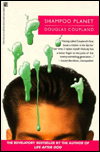
- Tyler’s hippie mom, Jasmine, separates from
Dan
after he
writes “D-I-V-O-R-C-E”
on her forehead.
- Tyler’s Euro-fling, Stephanie, shows up and
they
take off for
L.A.
POLAROIDS
FROM THE DEAD
(1996)
Paperback
ReganBooks, New York
1998.11.12 – 1998.11.13

- Random encounters with Dead-heads.
- 122: While discussing the James Rosenquist’s
painting
“F-111”
We emerge from our mother’s
womb an unformatted diskette;
our culture formats us.

- 152: Outside restaurants are shaded at the request of
customers because
anti-depressants cause photosensitivity.
- Commentary on Brent Wood community.
MOVING
MARS (1993)
Paperback
TOR, New York
1998.11.15 – 1998.11.25
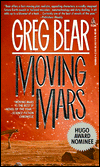
- Mars was colonized with cooperative families, Binding
Multiples, but
had
a false start with unification.
- Casseia Majumdar and Charles Franklin were among two
student protesters.
- Casseia was called to be the temporary Vice President
during a second
transition.
- Charles was working with the Olympians on
“tweaking
descriptors”, at the
cutting edge of quantum physics.
- Heavy reliance is placed on nano-machines and
information-carrying
viruses.
People need to be “immunized” before going to big
cities.
- 83: All habitable stations are required to be surveyed
and
inventories
yearly in order to be placed on charts for emergencies.
- Casseia met Orianna on her journey. While
still a
teenager,
Orianna
has experienced so much.
- People do sims for entertainment.
- Robots (arbeiters) are everywhere.
- A.I.’s are treated (more or less) just like
people.
- There was very extensive life on Mars in the past.
DOOMSDAY
ASTEROID
Can We Survive? (1996)
Hardcover
Prometheus Books, New York
– 1998.12.8

- Rather than NEA, they prefer the term COTE = Celestial
Object
Threatening
Earth.
- Includes a little about the history of discovery and
the
“dinosaur crater”.
- They are critical of a committee’s
recommendations,
specifically that ground-based
telescopes should look at midnight skies.
- Suggest space-based “Humble”
telescopes.
- 149: Rule of thumb: The amount you can steer your probe
toward or away
from your destination is the product of the mid-course correction
velocity
you applied multiplied by the time remaining before you arrive at your
destination.
- 165: The DV
which a neutron bomb might
impart on a 1 km-wide comet; 20 Mtons would deflect 2 m/s.
The the
impulse is applied 2 months before impact, it would be deflected 1.5
Earth
radii.
- They establish that we need SSTO. Suggest
using
and NEO for
transport
to the asteroid belt. Its orbit should be altered for an
integer
period of one year.
- 228:
BULLY
FOR BRONTOSAURUS
(1992)
Hardcover
W.W. Norton & Company, New York
– 1998.12.12

- 11: His type of popular writing is technically known as
“vulgarism”.
- 59: The QWERTY keyboard arrangement is so ubiquitous
because it was the least
efficient arrangement. Typing too fast would cause early
typewriters
to jam.
- 149: Wings could have arisen for
thermoregulation. Small
wings have
little aerodynamic effects.
- 176: The “Standard” model of horse
evolution is a
misnomer. A typical
diagram is incorrect because it includes dead-end species that are not
ancestors to modern horses. Includes a more exact diagram
with correct
branching.
- 184. French spiritualist Mesmer (as in
“Mesmerism”)
was big in the 1770s.
He was debunked by Benjamin Franklin and Lavoisier.
- 213: Abbott H. Thayer made a
“crazy”
theory that
flamingoes are pink so
as not to be seen against a sunset. However, he did realize
that
animals are lighter on the bottom for countershading; to look
2-D.
He overextended, and tried to explain everything as camouflage.
- 295:
Darwin delighted in Bates’
discovery because he viewed
mimicry as such a fine demonstration of evolution in action.
Creationism,
Darwin consistently argued, cannot be disproved directly because it
claims
to explain everything. Creationism becomes impervious to test and,
therefore,
useless to science. Evolutionists must proceed by showing that any
creationist
explanation becomes a reductio ad absurdum by
twists of illogic
and special pleading required to preserve the idea of God’s
unalterable
will in the face of evidence for historical change.
Intelligence is too complex and
multifaceted a thing to reduce to
any
single dimension.
- 319 - 320: The idea of the Strong Anthropomorphic
principle
invokes
probability.
However, this is really a useless measurement because we have no sense
of context.
- 327: Tolstoy
on Darwin as dying.
Kropotkin thought Darwinism leads to cooperation.
- 343: “Whiggish History” = judging
historical
figures by modern (and non-applicable)
standards.
THE
CASE FOR MARS
The Plan To Settle The Red Planet And Why We Must (1996)
Paperback
Touchstone, New York
1998.12

- The Mars Direct plan is the cheapest way to get to Mars
by
using
In-Situ
propellant production. The return ship will be fueled and
checked
before the astronauts leave Earth.
- Each mission leaves a hab (habitat module) for later
missions. By
accumulating modules on Mars, we make it the second safest place in the
solar system for astronauts, reducing later risk.
- George H. W. Bush’s plan for Mars was very
bloated.
Many at NASA
might find Mars Direct “too” inexpensive, as their
own programs become
less relevant.
- Recommends a crew of 4, with no dedicated
pilot.
Artificial
gravity
is a must.
- 110: (V0
+ DV)2
= Ve2+
Vh2 =
Vr2
, where
V0 =
velocity
of spacecraft a lowest part of
departure orbit.
Ve = planet escape
velocity
(e.g. 11 km/s for Earth,
5 km/s for Mars)
Vh = hyperbolic
velocity
Vr = reentry velocity
- 163: Timekeeping; recommends a New
“Martian” s, m,
h such that 24 Mars
hours = 24h 39.6m. This would make navigation
easier. This
is at odds with Kim
Stanley
Robinson’s “Timeslip” idea from
RED
MARS (1993).
- 166: Calendar; the 12 signs of the Zodiac for Martian
year.
- 230: “triangle trade”
- 253: Terraforming; Partial pressures.
- 271: Equations
- 277: Proposes three different Mars models:
“J. F.
K.”, “Sagan”, and
“Gingrich”
(contests and prizes)
- While SSTOs are not required, they could be made to
work
just as well.
SKUNKWORKS
A Personal Memoir Of My Years At Lockheed (1994)
Paperback
Back Bay Books, Boston
1998.12

- F-117s were the exclusive aircraft over Baghdad on the
first night of
the
Gulf War.
- 51: Kelley Johnson’s 14 rules.
- Carter canceled the B-1 because he knew that stealth
made
it
obsolete.
Reagan was campaigning on bringing it back. Carter considered
giving
candidate Reagan a secret briefing on the topic, but never
did. Once
Reagan beat Carter (for being too soft on defense), the B-1B was
revived.
- The SR-71 was going to be and air-to-air interceptor.
- The Navy did not want stealth ships because of the
small
crew
compliment.
Officers need lots of sailors to order around in order to get promoted.
- 96: F-117s were not used in April 1986 to bomb Kaddafi.
- 169: Kelley researched a hydrogen airplane.
When
the design
was insurmountable,
Kelley returned the funding to the government.
- 324: Why build the luxury model?
- 327: President Johnson switched called the RS-71 an
SR-71
in a
speech.
Rather than admit a mistake, lots of money was spent to change the name.
- Idea for large dirigibles for mass
transportation. They would
be
safer than tankers.
COMET
(1985)
Hardcover
Random House, New York
1998.12
- 50: Newton’s works on the comet of 1680
included
observations
from Patuxent
River.
- 62: Apollonius of Perga was a mathematician and
astronomer
in 3rd Century
B.C. Alexandria.
- 205:
On first hearing where babies come from,
many of us
express a certain skepticism. Often what is being described does not
correspond
to the listeners’ own observations. Compared to storks,
angels, and cabbage
patches, the machinery seems unwieldy and improbable. But no
matter
how implausible the story may seem at first, there is a reasonable
consensus
among knowledgeable individuals on the matter. Direct experience
eventually
converts even the most committed skeptic.
 MNRay.net
MNRay.net
 MNRay.net
MNRay.net


























